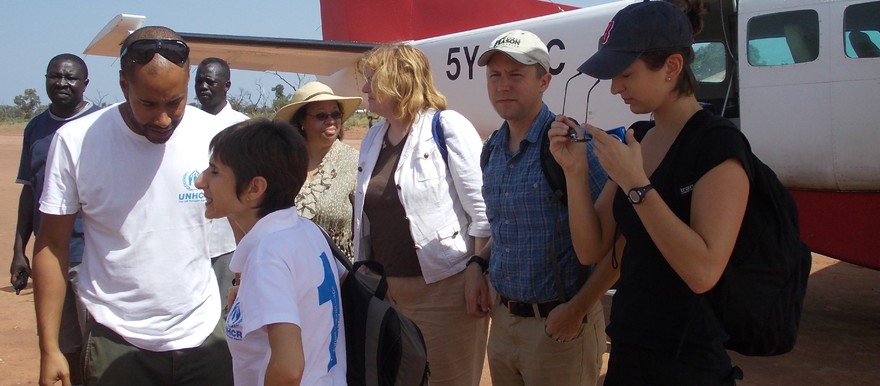Thousands of Nuba refugees and students demonstrated before visiting officials from the UN Refugee Agency (UNHCR) and United States Government over a policy to withhold education materials from Yida Camp. The policy is linked to UNHCR standards on how close a refugee camp should be to an international border.
UNHCR Country Representative Mireille Girard, US Ambassador Susan Page, and US Assistant Secretary of State Anne Richard were met by protesters on Monday upon their arrival at Yida airstrip, near South Sudan’s northern border with Sudan.
These officials have backed a policy to withhold learning materials, seeds and farming tools from the 60,000 refugees in Yida saying that the camp is too close to the border with Sudan’s South Kordofan state. International aid organizations working in the camp cannot assist refugees in the education or agriculture sectors without jeopardizing their funding from the UN.
The crowd at Yida airstrip met the visiting officials with “indignation and real coldness,” according to a Radio Tamazuj correspondent at the scene. Members of the crowd held signs saying ‘Education First,’ ‘6 Months Without Education,’ and ‘Open the Doors for NGOs,’ as seen in photos taken at the protest.
But UNHCR maintains that it will not assist schools in Yida Camp. Questioned about the policy, UNHCR acknowledged in an e-mailed statement earlier this year that it “cannot undertake interventions that fix refugees in dangerous locations through, for example, establishing formal schools or supporting agriculture. Such interventions are being undertaken at a more secure distance from the border. Those refugees from Southern Kordofan who have relocated already have access to these expanded services.”
In remarks delivered in the camp, US Assistant Secretary of State Anne Richard defended the education policy: “We should look for some more places, find some places that are comfortable for the Nubans, have them further away from the danger, try to maybe move children who need to go to school and their mothers, so that we can set up schools there and we can get a lot more children into school, because I heard your education message very clear.”
The remarks did not indicate any shift in policy. The foreign officials instead pointed to long-standing goals of finding alternative camps to Yida, as well as accelerating the process of negotiations between Khartoum and SPLM-North to permit aid access into Nuba Mountains, the homeland of the Yida refugee population.
Nuba camp leaders nonetheless construed the visit as a positive step, during which they managed to send their messages directly to the US officials without the obstruction which they felt the UN Refugee Agency had been.
Yida Camp Commissioner Hussein Gombala, a former official in South Kordofan state, addressed his remarks to the US officials rather than the UN ones: “We are not here because we want this land, but because we are looking for our freedom.”
“They [the protesters] are pleading that the American government will do something. This year the food is not enough,” he said.
Yida Camp in northern Unity State of South Sudan is only a few kilometers from Sudan’s South Kordofan State, where the Sudan Armed Forces and Sudan People’s Liberation Army-North have been fighting since June 2011. Most of the Nuba refugees at Yida refuse to relocate to UNHCR’s Nyeel site, which is 40 km from the border.
The camp continues to grow as the situation in the Nuba Mountains to the north deteriorates. Pressure to move the refugees farther south, however, has not succeeded owing to a number of factors including the superior quality of the soils around Yida compared to the UN sites.
UNHCR’s policy drew fierce criticism last March from Dr. Mukesh Kapila, the former top UN aid official in Sudan, who told Radio Tamazuj: “The international community’s humanitarian policy led by UNHCR is to severely restrict aid going in to needy civilians in Yida, pressurizing them to move by not giving them enough food, water, and other needs. Now, that is immoral, unethical and anti-humanitarian.”
Click here for photos of the event.
See also: UN ‘withholds’ aid from camp on Sudan border say refugees, ex-UN official (16 March 2012)
Photo by Radio Tamazuj: UNHCR Country Representative Mireille Girard (foreground), US Ambassador Susan Page (in sun hat), US Assistant Secretary of State for Population, Refugees and Migration Anne Richard (center), with other unidentified Americans (right).



